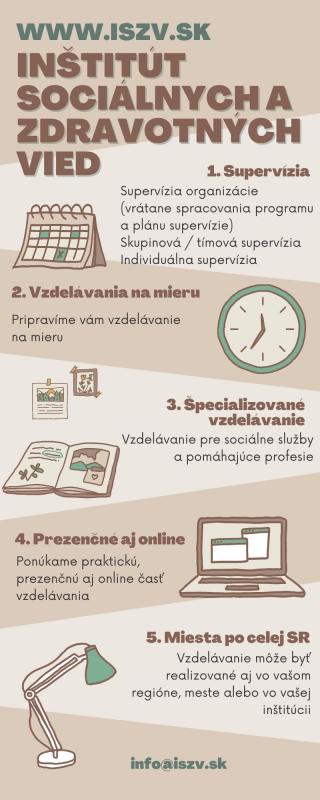Koncept edukačnej sociálnej práce – zdôvodnenie © 1
Concept of educational social work - the reasoning © 2
Abstract: In this paper we present the reasoning of our our author´s innovative concept The educational social work, characterizes the social reality of people in the postmodern age which creates a new identity of social work and a new identity of social client. We based on the assumption that the most effective ways and means of social help is lifelong learning and social education of adults. Justifies the inclusion of the educational social work in the system of social work as the science and emphasize the practical necesity of educational social help to adults.
Keywords: Educational social work.Identity of the social client. The educational social help.
Abstrakt: V príspevku prezentujeme zdôvodnenie nášho autorského inovatívneho konceptu Edukačná sociálna práca, charakterizujeme sociálnu realitu ľudí v súčasnej dobe, v ktorej sa formuje nová identita sociálnej práce a nová identita sociálneho klienta. Vychádzame z predpokladu, že najúčinnejším spôsobom i prostriedkom sociálnej pomoci je celoživotné učenie sa a sociálna edukácia dospelých ľudí. Zdôvodňujeme zaradenie edukačnej sociálnej práce v systéme vedy sociálna práca a zdôrazňujeme praktickú potrebnosť edukačnej sociálnej pomoci dospelým.
Kľúčové slová: Edukačná sociálna práca. Identita sociálneho klienta. Sociálna pomoc.
Introduction:
The concept of educational social work as an innovative component in the system of social work as a social science, a field of study and social help is a result of our long-time theoretical as well as practical pedagogical work, research and also our firm belief that
- spiritual poverty results in material poverty, therefore it is essential for social work to demonstrate its identity as a science, a field of study and practical work also by projecting its social benefit in promoting social self-help of people in order to enhance their social and mental maturity and responsibility for their own life;
- social work should be an efficient and real (not only proclaimed) support of social health, in other words the support of social communication and social relations enhancing social and mental integration and adaptation of people in their life environment that is both provable and supported by tools available to social work;
- the primary aim of social work does not consist of treating social problems and social pathology, but it is supposed to be a real not only proclaimed social development program to support cultivating one´s social and individual potential.
Holistic approach
The concept of Educational social work is based on a holistic approach in understanding of an individual, the social environment and their mutual dynamic relationship; a systematic approach in understanding one´s development as an individual system within the social environment and educational systems; a humanistic approach in understanding the content and importance of education as a way of social help, guidance to self-help and development of one´s potential. The concept thus represents an intersection of educational and counselling paradigms of social work.
The Educational social work concept is justified by the context of living conditions of people in today´s postmodern age. We felt that it is more than important to point out the mutual social determination of a man and society and thus highlight the mutual respect and responsibility of individuals, groups of people and society as a whole. What happens to one person is a private but at the same time public matter. It is not enough to offer people one-time social help. It is desirable to educate people and guide them to self-awareness and social self-help with the idea of enhancing one´s individual potential. The reason is clear, it is people where we need to search for the meaning of life and the source of change in their life. Only then can they struggle through life and use their gifts and talent.
The justification of the Educational social work concept
The answers to the questions we have decided to open a scientific discourse for reflect our own professional opinion and look on the scientific and practical reality concerning the educational social work area of knowledge.
What is social work? The simplified answer could be: The science, research and practice in the social life of people focused on an individual when working on the social life micro level; focused on social groups and communities when working on the mezzo level; focused on social wholes (nation, state) when working on the social life macro level.
What makes the subject of social work as a science specific? What makes its theoretical reflection in people´s social life specific?
The attribute “social“ may be found in the subject of several sciences, e.g. social philosophy, social anthropology, social science- sociology, social psychology, social pedagogy, social andragogy, social medicine, social biology, etc.
It means that the only difference between all the above mentioned sciences with the adjective ”social“ in their name, is a science problem. The science problem it is the centre of scientific and research interest of a particular science.
Social problem
A scientific problem in social work is a social problem – of an individual, social groups or social communities. A social problem is more or less difficult. In general it requires a complex solution as the same social problem is a matter of an individual but also of a certain social group they live in and a certain society they are citizens to, too. It means social problems always consist of more dimensions (they are multidimensional). Let us mention the following dimensions of one´s social problem: the dimension of spiritual and psychological experience, the dimension of social inclusion or exclusion, the dimension of various human activities - work, hobbies; the dimension of social roles – roles in family, at workplaces, in informal friends, neighbours, community groups, roles in public life, roles in formal groups at school, at workplace, in interest groups, political party; the dimension of health, the cultural dimension and others.
Determination of social problem
The social problem as the focus of the scientific, research, practical interest of social work has different causes (determinants) and different nature (aspects) in different people. Even if it looks like the same problem, it is not. For example the fact of being unemployed brings very different social problems to every unemployed person. When talking about an individual or group social problem, the causes and a person or a group that are the subject of a social problem must be carefully considered, i.e. different determination of a problem and thus different aspects of the social problem are considered.
Every social problem is usually caused by several determinants. If we take into consideration the fact that a specific person – a social client is a unity of spiritual, psychological, somatic and social aspects of human existence, their potential social problem is always a problem of “the whole person“. A social problem of being unemployed can be presented not only as a change or loss of financial income but also disagreements in family life, worsened health status, mental disorders, deterioration in spiritual and mental level. One of the causes of social problems may be one´s personal, health, age or educational handicap.
An individual social problem is at the same time a spiritual and philosophical problem of a specific person since it regards their life values. And simultaneously, it is a health problem, because it regards a threat to one´s life and also a psychological problem as it involves one´s psyche, behaviour and actions.
Subject of the social work science
Taking into consideration the nature of a social problem, we presume the subject of the social work science has more dimensions. It can be perceived as a high complexity subject and into a certain extent as an umbrella subject of social work science, research and practice. The subject of social work can be defined as follows:
- A. The theoretical and methodological dimension of social work as an empiric science.
- B. The methodological dimension of social work, that is theory and methodology implementation.
- C. The practical dimension of social work.
The theoretical frame of a social problem ↔ research and practical method ↔ implementation in practice (implementation of a theoretical knowledge in social work practice in form of social help)
And vice-versa:
The implementation in practice (social help) ↔ research and practical method ↔ scientific reflection of a social problem (implementation of empiric knowledge in social work theory)
The theoretical knowledge of social work brought to a specific implementation of social help and the following empiric knowledge from social help put into the frame of theoretical knowledge lead us to the understanding that the helping process in social work involves several professionals from the field of social work as well as professionals from other science fields and helping professions.
The aim and potential of social work
All of them are united based on the main aim of social work, which is to provide preventative and rehabilitation social help to people in material and social need. Therefore it is questionable and counterproductive to expect social help to be provided solely by workers with the degree in the field of social work.
Providing social help involves social workers as well as professionals specialised in other important fields indispensable to providing various forms of social help: legal social help, medical and health social help, psychological social help, spiritual social help, educational social help, etc.
This fact is a result of social work as a science and practice. As we have already mentioned the subject of social work is multidisciplinary and is defined by interdisciplinary intersections. (For example educational social work is the intersection of the result of the social work and social education knowledge). The subject of social work is characterised by transdisciplinarity, so it outreaches the sciences entering social work and from which social work emerged.
Social work has its own theoretical, methodological and praxeological scientific potential. It needs to be pointed out that as a part of continuing process of emancipation of social work as a science, a field of study and social practice, social work uses also adapted methods of other sciences: political sciences, economic sciences, sociological sciences, spiritual sciences, philosophical sciences, psychological sciences, culturology, medicine sciences, legal sciences and other sciences concerning people and society.
Current context of Social work
Modernization
What can the modernization of society mean for social work or educational social work as a science and a field of study?
The modernization of society is a process taking place while traditional and new exist in society side by side. People need to adapt to life conditions with wide-rage changes quite fast. “Modernization means an ambivalent process of permanent change with pros and cons – life offers to people many more options regarding personal, professional and social development than ever before. However, these options are chances and limitations at the same time. On the one hand they represent the increase of freedom and decision making, on the other hand the decline of certainties and inevitability to look for one´s own way outside traditional models of work, family, relationships and communication“. (E.Gruber,2001, p.14-23.) (translated by the author)
P. Ondrejkovič draws attention to the theory of hyperreality (according to Baudrilard,2006. In: P. Ondrejkovič, 2008, p.32). Hyperreality is defined by “The agony of solid relationships, the agony of real and rational“ and the arrival of the age of simulation, “for example the ´hyperreality´of a dream world of Las Vegas or the invention of a fruit juice containing extract from a non-existent fruits.“ (translated by the author)
People face the phenomena of modernization: expanding rationalization; significant pluralization; continuing individualization; disappearing boundaries between work, job and education; looseness in manners and behaviour that have been functioning on basis of tradition and social norms; unification in social and cultural field, the need of people to permanently search for their place in the world and their environment; the change of interpersonal relationships. (Z. Baumann, 2002. In: M.Sycha, 2012, p.26.)
Knowledge society
The initiative called European path to information society (created 1994) brings ideas how to prepare citizens for the new age. The task is to guide citizens to accepting changes that are a part of the development of information society (knowledge society).
The education of people is supposed to be vital in creating “a European model” of society. It should also support social inclusion and enhancing people´s personal competences and their personal development in connection to their life´s roles. The starting point is the strong belief that lifelong learning and educations plays a key role in the life of individuals and society.
The education of adults3 is becoming an important part of life for the population that is facing “the complexity of the world and is seized by the power of financial world, the world of science and technology and the world of mass media. (J. Lefort, 1997, p.37.) (translated by the author)
It is particularly necessary to consider whether the process of education really does what its name suggests. Education is a synonym for cultivation and it differs from training and one-sided indoctrination by the degree of refinement which can be seen in the level of the freedom of one´s moral consciousness, the degree of being aware of social consequences of one´s motives and the knowledge of what rules of belief, benefit and beauty, interpersonal relationships, life and its humanisation improvement mean. (Š. Švec, 1995, s.72.)
Conclusion
Talking about the purpose of the concept of educational work, we must also point out the understanding of change in today´s social reality. New principles of scientific reasoning and practical actions are discussed in the intentions of postmodern paradigm: “order and chaos are complementary, the observer defines the observed by his observation; each value is limited historically, contradictions and casualness cannot be eliminated“ (J. Bělohradský, 2002. In: M. Sycha, 2012, p.26.) (translated by the author)
It is obvious that people cannot react actively to each social change, they have to set their priorities and decide which changes they consider important and focus on those. It is necessary for the ability of people to adapt to social transformations to increase on the level of a person as well as a social unit. (M.Sycha, 2012, p. 28.) And in the Educational social work point of view that is the main reason and purpose of the social education of people in today.
Author: Prof. PhDr. Mária Machalová, PhD.
1The concept of Educational social work the author of this article published in these monographs:
MACHALOVÁ, Maria. 2013. Preventívna sociálna práca - Edukačná paradigma v sociálnej práci. (Preventive social work – Educational paradigm in social work.) Prešov: Prešovská univerzita, 2013.
MACHALOVÁ, Maria.2014. Edukačná sociálna práca. (Educational social work.) Prešov: Prešovská univerzita, 2014.
2The concept of Educational social work the author of this article published in these monographs:
MACHALOVÁ, Maria. 2013. Preventívna sociálna práca - Edukačná paradigma v sociálnej práci. (Preventive social work – Educational paradigm in social work.) Prešov: Prešovská univerzita, 2013.
MACHALOVÁ, Maria.2014. Edukačná sociálna práca. (Educational social work.) Prešov: Prešovská univerzita, 2014.
3From our point of view, the term education of adults, includes the education and educational counselling for adults. When talking about the adult education, we mean instruction, education and educational counselling for adults. Education must go hand in hand with instruction and vice versa. The term education of adults, for us, intertwines three educational realities: instruction, education and counselling as means of helping to guide adults to learn how to learn, to engage in lifelong learning and learn in term of preparing themselves to handle stress life situations.























